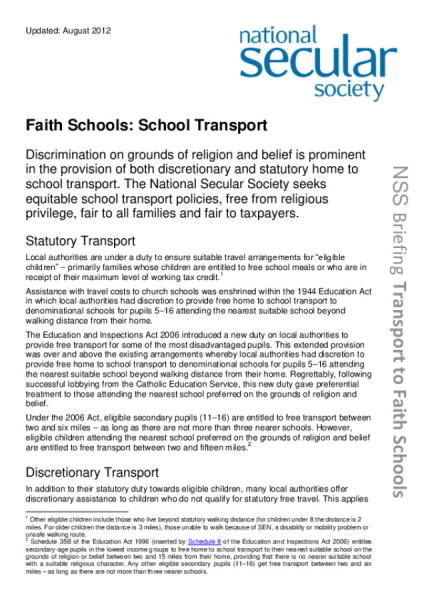Transport to faith schools
Discrimination on grounds of religion and belief is prominent in the provision of both discretionary and statutory home to school transport. We seek equitable school transport policies, free from religious privilege, fair to all families and fair to taxpayers.
 Faith Schools Transport Briefing Paper (PDF, 222 Kb)
Faith Schools Transport Briefing Paper (PDF, 222 Kb)
Related news
State-funded faith school warned by government for sex discrimination
Posted: Fri, 13 May 2022 15:46
A state-funded faith school has been warned by the government after failing an inspection for discriminating against girls.
The Department for Education issued a termination warning notice to King David High School's academy trust after it failed an Ofsted inspection in March.
Ofsted downgraded the King David High School, a Jewish academy in Manchester, from "outstanding" to "inadequate" after discovering pupils in the single-sex unit suffered discrimination.
A termination warning notice is issued when a school must take special measures to improve. If the school does not improve, the government can shut the school down or appoint additional directors.
The school's trust board "has not ensured that the school fulfils its statutory duties under the Equality Act 2010" regarding pupils who attend the school's Yavneh Girls unit, the warning notice said.
An Ofsted inspection in November 2021 found pupils who attend Yavneh Girls are "separated from all other pupils at the school throughout the school day, including during breaks and at lunchtime".
Segregating pupils according to sex within mixed-sex schools was found to amount to unlawful sex discrimination in a landmark ruling in 2017, after the National Secular Society and other campaigning organisations highlighted the issue.
The notice also said leaders and trustees "have not ensured that effective safeguarding arrangements are in place".
In addition, students lack a decent careers education to help them make decisions about their future.
NSS comment
NSS education campaigns officer Ella Sen said: "We welcome the DfE's actions to hold this school to account.
"All girls should be given access to high-quality education whereby they are not isolated and treated fairly.
"Unfortunately, sex discrimination is a consequence of allowing schools to be run according to a conservative religious ethos. Education authorities must continue make it clear a religious ethos can never be used to justify discrimination."
Inspectors criticise Catholic Church for banning gay author’s school talk
Posted: Thu, 28 Apr 2022 08:51
School inspectorate Ofsted has criticised the Catholic Church for forcing a school to cancel a talk by a gay children's author.
In a letter to the John Fisher School in Croydon, Ofsted said the Archdiocese of Southwark's actions had "unnerved and upset many in the school community".
The letter follows a snap inspection of the school in March prompted by the diocese's actions.
Simon James Green (pictured), an award-winning children's author, had been invited by school leaders to visit John Fisher School in March to talk about his career.
But the diocese, which oversees the Catholic secondary school for boys, called on leaders to cancel the visit because it fell "outside the scope of what is permissible in a Catholic school".
Its intervention followed a campaign by the website Catholic Truth and an email from the school's chaplain to parents protesting the talk.
The school's governing body voted in favour of the leaders' decision not to cancel the visit. In response, the diocese sacked school governors supportive of Green.
The diocese intended to replace the governing body with an interim executive board (IEB), but Sutton Council found that this did not comply with the law.
Ofsted also criticised the move, saying: "While the Catholic Church retains control of governance in Catholic schools, the archdiocese's attempt to impose an IEB was made unilaterally and without due regard to the published statutory guidance regarding the appointment of IEBs."
Ofsted said some leaders, staff and pupils "have been left feeling angry, confused and frustrated" by the events. It said some are "worried about the impression these events might give of the school's ethos".
Members of the National Education Union at the school are on strike today to protest the diocese's actions, despite threats to sack them by the governors appointed by the Catholic Church.
NSS comment
The National Secular Society has previously highlighted how faith schools, included those that are state-funded, are permitted to teach stigmatising ideas about gay people and same-sex relationships.
The government permits faith schools to teach about relationships and sex "according to the tenets of their faith". This has resulted in some faith schools teaching that same-sex relationships are morally wrong.
Alastair Lichten, head of education at the NSS, said: "This case demonstrates the tensions caused by having state-funded schools controlled by religious institutions.
"Leaders and governors at the school were overwhelmingly supportive of Green's visit. But for the Catholic diocese that ultimately controls the school, the idea of an openly gay man talking to pupils was clearly beyond the pale.
"Teachers' desires for the school to be an inclusive place of learning were brutally undermined by the diocese's homophobic religious agenda. This could lead to a chilling effect on other faith schools that want to be more inclusive.
"The only way to ensure such tensions do not arise again is for all state-funded schools to have an inclusive, secular, community ethos – without interference or imposition from religious groups."
Image from Simon James Green's website.
Religious opt-outs from RSE harming women’s health, report says
Posted: Wed, 20 Apr 2022 09:11
Religious exemptions from sex education at schools should be removed to protect women's health, experts have said.
The recommendation was also made by the National Secular Society in its response to a consultation on the government's strategy on women's health last year.
Last week the Department of Health and Social Care reported on the consultation responses, which also highlighted religious barriers to reproductive rights and the role of religion in violence against women and girls.
RSE "with no exemptions"
The NSS said religious opt-outs and exceptions for relationships and sex education (RSE) enable some faith schools to teach stigmatising ideas about contraception, abortion, menstruation and same-sex relationships.
The report said organisations and experts recommended that the government "review the variation" in RSE taught across all schools to ensure young people can access "unbiased and inclusive information". They said RSE should be taught to all students "with no exemptions for individuals or institutions", and include challenging "the perception that a woman's or girl's worth is connected to virginity".
Respondents said girls who attend religious schools or who are withdrawn from school do not have access to "the same level of unbiased, quality information on sexual health, contraception and abortion".
Reproductive rights
The NSS's response raised concerns that at some pharmacies staff have refused to provide women emergency contraception, citing religious reasons.
The concerns were repeated in the report, which said experts and organisations recommend "better education and guidance for healthcare professionals, including pharmacists" on giving women "unbiased information on the different types of contraceptives (including emergency contraception) available".
Respondents also recommended increasing use of virtual appointments and at-home abortions. The NSS supported an amendment to the Health and Care Bill which allows early medical abortion medicine to be taken at home.
Violence against women and girls
The NSS's submission was one of 77 responses which touched on the impact of violence against women and girls on women's health. It highlighted the role of religion in 'honour' crimes, female genital mutilation (FGM), and 'virginity testing' and 'repair' (hymenoplasty) procedures.
The report said organisations and experts recommended a ban on virginity testing and hymenoplasty. The NSS is supporting measures in the Health and Care Bill to outlaw both procedures.
NSS comment
NSS head of policy and research Megan Manson said: "It is encouraging that this report has acknowledged concerns raised by ourselves and others about religious threats to the health and wellbeing of women and girls.
"These findings must now be translated into policies to ensure women's health is never undermined by religious institutions. Religious exemptions to objective and inclusive RSE must be removed, access to reproductive healthcare guaranteed, and religious ideology underpinning violence against women robustly challenged."
NSS calls on Wigan Council to rethink non-faith school closure
Posted: Tue, 12 Apr 2022 11:24
The National Secular Society has called on a council not to close a community primary school, warning the move would devastate local secular school provision.
The NSS has been supporting families in the Abram area of Wigan, where Wigan Council must consider closing either Holy Family Catholic Primary School (a Catholic faith school) or Abram Bryn Gates Primary School (a community school) to address financial issues arising from falling pupil numbers.
Earlier this year, the council bought forward plans to close the community school, despite warnings from the NSS that this may breach their duty to provide "appropriate education".
In its response to the council's most recent consultation on the issue, the NSS argued the council's reasoning for their decision to close the community school did not give adequate consideration to their Education Act or Human Rights Act duties, or guidance on maintaining the "balance of denomination provision".
NSS analysis shows 81% of postcodes in Wigan, and 90% of postcodes in the Abram ward, already experience "high" or "extreme" restrictions on the choice of a non-faith primary school.
And its analysis of school places figures provided by the council indicates that if Abram Bryn Gates were to close, 69% of pupils would be reassigned to faith schools.
In a March 2022 report to cabinet, the council acknowledges parents of children at Abram Bryn Gates Primary "have specifically chosen a nonfaith school for their child".
The report says: "There is no desire for their children to be taught in a faith-based school. There are no other community non-faith based schools available within the area or within a reasonable distance of where children live that have places available."
The council's analysis recognised there is "no preferred option by stakeholders". In response to a consultation last year, 45% of respondents supported the closure of Holy Family, while 47% supported closing of Abram Bryn Gates. Both schools have similar budgetary, levels of undersubscription and Ofsted results.
Comments
NSS head of education, Alastair Lichten, said: "Closing Abram Bryn Gates will be bitterly disappointing to many families and highlight the desperate need to address the bias against secular schools in such considerations.
"While imagining a duty to 'provide a Catholic school place for all', the council continues to treat parents' opting for a community school as not worthy of protection or adequate consideration."
Local resident Julie told the NSS: "Closing this school would not only devastate pupils and staff but rip the heart out of the community too. Choice of non-faith schools is already limited for parents."
Another parent, Janine, commented: "Closing ABG is a joke! There are no other schools in this area for children who aren't religious.
"It's a fantastic school and if it closes children will be forced to go travel miles to go to another school many of which are full and have no places available anyway."
Time to follow Northern Ireland in ending religious discrimination against teachers
Posted: Tue, 12 Apr 2022 10:09
After ending a blanket exemption from equality laws, Northern Ireland will outlaw religious discrimination against teachers. Ella Sen examines the situation across other UK nations and urges them to follow suit.
Religious discrimination against teachers in Northern Ireland is slowly coming to an end. By 2024, the Fair Employment (School Teachers) Bill will remove the blanket exemption from the Fair Employment and Treatment Order 1998 (FETO) allowing schools to select teachers according to religion.
The situation is still far from perfect. Other structural issues will remain, including a requirement for a certificate in Catholic education in many schools, making it harder for some teachers to work in schools outside their community.
Nevertheless, the end to the FETO exemption will help pave the way for greater integration in the nine in ten schools currently segregated according to religion. It will give teachers across NI greater freedom in where they work without being held back by their background or beliefs.
And in a surprising twist, the reform is set to give more protection to teachers from religious discrimination than anywhere else in the UK.
In England and Wales, the School Standards and Framework Act 1998 allows faith schools to apply a religious test when appointing, remunerating, retaining or and promoting certain 'reserved teachers' or in disciplining them for conduct that is "incompatible with the precepts… of the (school's) religion".
'Reserved teachers' can include one fifth of teaching staff, including the headteacher in voluntary controlled faith schools (mostly Church of England) and all teachers in voluntary aided faith schools (mostly Catholic, some CofE and other minority faiths). The situation in academies and free schools with a religious character will depend on their funding agreement.
The ability of faith schools to religiously discriminate against teachers is enabled by a number of exemptions in the Equality Act 2010. Without these exemptions, such discrimination would be unlawful.
The legality of such discrimination can even take experienced and qualified teachers by surprise. Many cannot believe how our society can possibly permit certain public servants to be hired over others because of their religion.
Research in 2019 by Teacher Tapp found that while schools of all types rely on nonreligious teachers, these teachers are significantly underrepresented in faith schools. The exclusionary policies and ethos of faith schools may explain why 75% of nonreligious teachers would not like to switch to a faith school. Though religious and nonreligious teachers are both very comfortable discussing religion and belief issues in non-faith schools, nonreligious teachers in faith schools are significantly less comfortable – perhaps an impact of knowing they could be legally disciplined for the 'wrong' views.
The situation is similar in Scotland. Almost all denominational (faith) schools in Scotland are Catholic. The process of applying to teach usually requires a Catholic Teaching Certificate. Applicants also need to submit forms confirming their commitment to "supporting and developing the ethos of Catholic education", with a religious reference, for approval by the local bishop.
A teacher's religious affiliation has no relevance to teaching English, maths or any other subject. Yet it causes significant barriers for the 58% of Scots who are nonreligious. The Education (Scotland) Act 1980 should be amended to end such discrimination.
Enabling this form of discrimination in Catholic schools can lead to absurd scenarios. In 2019 St Martin's RC Primary School only allowed non-Catholics to apply for its headteacher position after three unsuccessful attempts to recruit a specifically Catholic headteacher. And even then, they re-dubbed the role as 'leader of learning' – a role carrying the same responsibilities as a headteacher but with a less prestigious title.
Ultimately, organising schools around an exclusive religious ethos is always going to make it difficult for some teachers to work there, especially as more and more individuals identify as nonreligious. There should be no hierarchy of teaching opportunities based on individuals' religious or nonreligious beliefs.
And the progressive reforms taking place in NI should prompt us to challenge the archaic and discriminatory teacher employment laws in the rest of the UK.
We will be discussing many of these issues in our upcoming (21 May 2022) conference Towards inclusive education in Northern Ireland with reformers, activists, politicians and academics.
Do faith schools have a place in modern education? - Video
Posted: Thu, 7 Apr 2022 16:53
No More Faith Schools campaign coordinator Alastair Lichten made the case for an inclusive community ethos approach to education at a 'ThinkIn' discussion hosted by Tortoise Media.
A government blueprint for more religious control of schools?
Posted: Wed, 30 Mar 2022 15:43
The government's new proposals for education reform in England could see increased discrimination, and most non-faith schools placed in faith-based academy trusts. Alastair Lichten explores the threat to secular education posed by the 'Opportunity for all' white paper.
'Opportunity for all' sets out the government's vision for the future of England's education system. But perhaps the biggest opportunity created is for further religious control of publicly funded schools.
The white paper published Monday contains a few positive proposals and potential opportunities for secularists. However, the central proposal – a renewed push for all schools to academise and join multi-academy trusts (MATs) – poses a grave threat to the future of secular education.
More funding for CofE and other faith-based academies
Establishing a new MAT has costs for any provider, but the paper singles out those "which Dioceses and other religious authorities face" and gives them special treatment by committing to "develop options for financial support". This would put anyone developing secular or community ethos trusts at a disadvantage.
We've long warned that the government's enthusiasm for faith based MATs risks replacing secular oversight of state schools with opaque religious governance. The established church hopes to see local education authorities "wither on the vine" so they can take over this role. In our 2018 report on academisation and its threat to secular education, we revealed almost half of non-faith schools in MATs where potentially governed by faith based trusts, and hundreds had become faith schools. The proposals risk seriously accelerating this trend.
While the paper claims that once moved into MATs "schools will retain their ethos", the DfE have continually failed to set out meaningful protections for the secular ethos of community schools. This is in marked contrast to proposals to protect what is euphemistically referred to as "statutory freedoms" for faith schools that become academies. We should be challenging, not entrenching, the 'freedoms' faith schools have to discriminate when selecting pupils, staff and governors, or when creating their curriculum.
The commitment to "ensuring that all providers of schools with a religious character remain able to open new schools, once all schools are in trusts" has two worrying implications. The most obvious is more non-faith schools taken over, or faith schools forced under tighter control. But this could also herald another attempt to introduce new 100% religiously selective academies.
New attack on the 50% cap
Currently new academies (free schools) have a 50% cap on religious selection of their pupils. This has meant some religious groups (principally the Catholic Education Service) that wish to practice up to 100% religiously discriminatory admissions have had to propose voluntary aided schools instead. These face comparatively more scrutiny and opportunity for public opposition, so have been less successful. If the government want "all providers" of faith schools to continue opening new schools, and for all new schools to be academies, they may be preparing to weaken the 50% cap.
Rural schools
Protections for rural schools may also lead to increased religious control. Most rural primary schools are already faith based, and 47% of families in rural areas already face "high" or "extreme" restrictions on the choice of a non-faith primary school.
All these schools (faith and secular alike) may now need to join MATs, and Church run diocesan trusts are likely to be the only supported and established option. The idea of a community school free from church control could entirely disappear from large parts of rural England.
Admissions
The paper promises to deliver "fair admissions across England", including strengthening the role of local authorities to provide "fair admissions for their local areas". They even promise to "work with local authorities, trusts, schools and parents to develop options to reform the admissions framework, including the setting of over-subscription criteria".
Mention of religious discrimination and selection is conspicuously absent. But any discussion of admissions reform provides an opportunity to get this on the agenda.
Strengthening RSE
A commitment to "strengthen Relationships, Sex and Health Education" (RSE) guidance is positive. Current guidance undermines RSE by allowing schools to teach through a discriminatory, limiting or shame based religious ethos, and emboldening regressive religious groups targeting schools which do teach inclusive, comprehensive RSE.
Tackling illegal schools
The NSS has been pivotal in challenging unregistered, illegally operating faith schools. These are often deliberately unregistered to avoid safeguarding or education quality regulation. The commitment to "introduce legislation" to strengthen Ofsted's powers in this area is welcome. But such reforms are overdue and need to be coupled with support for local authorities.
What's next?
White papers set out broad principles not specifics. We will be engaging with the government over these proposals, seeking clarity where necessary, opposing greater religious influence, and supporting positive reforms. If you support our call for true equal "opportunity for all", then please consider joining the NSS, or supporting one of our campaigns.
An inclusive Britain starts with inclusive schools
Posted: Wed, 23 Mar 2022 10:49
Keeping religion and state education separate is the best way of ensuring schools promote free inquiry, equality and inclusivity, argues Stephen Evans.
Last week the government published its 'inclusive Britain strategy', setting out a range of actions to tackle racial and ethnic disparities and promote fairness.
A glaring issue overlooked is that of faith schools. Robust evidence shows that faith-based education builds discrimination into the system and undermines social cohesion by segregating pupils on religious, ethnic, racial and social grounds.
A third of state-funded schools across Britain are faith schools. The vast majority are Christian, and many of these operate discriminatory admissions policies. The impact of this is being keenly felt by families in Liverpool, where parents are struggling to access local schools, and youngsters are facing long journeys because nearby places are reserved for practicing Christian families.
Dr Amina Elmi from the Granby Somali Women's Group has been lobbying for a change in schools' admissions, arguing that admission policies are stopping "people from a certain community - from a certain race or faith - from getting into the schools in their locale".
The problem is acknowledged by local councillor Tom Logan, cabinet member for schools, who points to "a cluster of schools with a religious element to their admissions policies so if you're not Catholic or from the Church of England or you don't want a faith-based education, you'll find it difficult to get a place". Many parents up and down the country will have faced a similar situation.
The government's inclusive Britain strategy is focussed on addressing racial and ethnic disparities, but it's clear that a broader review is needed to address the myriad ways faith schools at best fail to foster, and at worst actively undermine, inclusiveness.
But there are encouraging signs that an increasing number of local people are willing to call out discriminatory admissions and make some noise. One such group is Fair Schools for Oldham, a group of parents, teachers, and local residents who got organised after they realised their new "multi-faith, multi-ethnic, inclusive school" was going to reserve 50% of its places for children of families that practice a faith – meaning half of its places will be closed to many local children. The group says it wants everyone to have equal access to good quality local state-funded schools, "regardless of their social class, religious faith, ethnic origin, or postcode".
Parents in Wigan are also fighting the unfairness of faith-based education. The council's plans to close a community school there will leave many families with no option other than a faith school. This in an area where the high prevalence of faith schools means 90% of families already face high or extreme restrictions on the choice of a non-faith school. Three in ten families across the country face similar restrictions.
Even when children are given a place in a faith school with a religious outlook they don't share, the faith ethos permeates all aspects of school life, making it far from an inclusive environment for many. Even non-faith-based academies and community schools are under a legal obligation to provide a daily act of broadly Christian worship, further undermining inclusivity. The only schools that do a good job of holding inclusive assemblies are those that ignore the law and omit the worship.
But the inclusivity problems in our schools go further than alienating children from different religion or belief backgrounds.
The disinviting of a gay author from a state-funded Catholic faith school in Croydon this month highlights how religious control of schools can negatively impact on inclusivity for LGBT pupils and families too.
The reason given by the Archdiocese of Southwark for cancelling the visit of award-winning children's author Simon James Green was that his representation of LGBT characters and support for LGBT rights was in conflict with their religious ethos.
The diocese says: "At the heart of every Catholic school sits the person of the Lord Jesus Christ and the teachings of the Catholic Church." Herein lies the problem. According to the Catechism of the Catholic Church, "homosexual acts" are "acts of grave depravity", "intrinsically disordered" and "contrary to the natural law." Our publicly funded schools shouldn't be agents of religious dogma.
The National Secular Society has long argued the requirement for faith schools to teach RSE and PSHE in accordance with their religious ethos creates significant tension with their duties under the Equality Act – and provides cover to marginalise LGBT pupils and stigmatise same-sex relationships.
NSS research revealed 77% of secondary faith schools in England are delivering Relationship & Sex Education according to the teachings of the school's religious ethos, rather than in an impartial manner. Many Catholic schools' RSE policies often explicitly denigrated same-sex relationships, or otherwise marginalised or excluded discussions of LGBT issues and representation of LGBT individuals.
Chair of the Catholic news weekly The Tablet Mike Craven says the treatment of Simon James Green "reinforces public perceptions of Catholics as prejudiced and Catholic schools places where teachers are second-guessed by bishops and bureaucrats and laity are ignored and marginalised." He says it will lead taxpayers and politicians to question why hundreds of millions of pounds of public money are being spent to allow a religious institution to reinforce public prejudice against a vulnerable group of young people." Quite.
He questions whether the prohibition on the physical expression of love outside heterosexual marriage is still tenable. That's a matter for the Catholic faithful and the Church. Religions will always have their internal theological disputes. These should be played out in churches, mosques, synagogues and temples, not schools.
There's no shortage of people who claim that religion is a force for good. And in many ways, it can be. But that's not the whole story. It can also be intolerant, divisive and discriminatory.
State education can play a vital role in creating a fairer, more open and more inclusive society. To achieve that, the schools we all fund should be equally welcoming to children of all religion or belief backgrounds, ethnicities and sexual orientations.
An inclusive Britain begins with inclusive schools. We need an education system that, at its core, promotes free inquiry, equality and inclusivity. Organised religion's continuing role in state education is a glaring impediment to that. That's why religion and state education must be kept separate.
State-funded faith school unlawfully segregates girls, Ofsted finds
Posted: Tue, 15 Mar 2022 15:07
A state-funded faith school is breaking the law by segregating girls, the school inspectorate has said.
Ofsted downgraded the King David High School, a Jewish academy in Manchester, from "outstanding" to "inadequate" after it found pupils in the school's single-sex unit suffered discrimination.
King David High School operates a mixed-sex "main school" unit and single-sex "Yavneh" units for boys and girls. The school says pupils "are free to move between the units at any time".
But an Ofsted inspection in November found pupils who attend Yavneh Girls are "separated from all other pupils at the school throughout the school day, including during breaks and at lunchtime".
In contrast, pupils who attend Yavneh Boys can mix socially with both male and female pupils in the main school.
The inspection report, published today, said Yavneh Girls pupils "do not have the same access to extra-curricular activities" as the pupils who attend Yavneh Boys and the main school.
Yavneh Girls pupils told inspectors they "feel isolated" and that the current arrangements, and "the behaviour of some staff", prevent them from mixing socially with pupils in the main school and Yavneh Boys.
Ofsted said Yavneh Girls pupils are "subject to a detriment because of their sex", which constitutes "unlawful direct discrimination on the ground of sex, contrary to the Equality Act 2010".
Segregating pupils according to sex within mixed sex schools was found to amount to unlawful sex discrimination in a landmark ruling in 2017, after the NSS and other campaigning organisations highlighted the issue.
In 2019, Ofsted criticised several independent faith schools after they were found to be unlawfully segregating pupils by sex. It also failed a Jewish independent school in 2021 for segregating male and female pupils in lessons.
Concerns were also raised regarding King David High School's relationships and sex education (RSE). Some teachers felt "ill-equipped" to teach about contraception, and older pupils said they "do not learn enough about different types of families or relationships". Faith schools are permitted to teach RSE according to their religious ethos.
Inspectors also found "widespread failures" in safeguarding. They said some pupils are "reluctant" to report safeguarding concerns to staff, particularly on issues relating to mental health, physical safety and peer-on-peer abuse, due to the way that some staff might react.
NSS head of education Alastair Lichten said: "It's shocking to see sex-based discrimination against pupils at any school, particularly a publicly funded institution.
"The convoluted steps some mixed-sex faith schools are taking to avoid legal restrictions on gender segregation continue to cause real harm to pupils, particularly girls from conservative religious backgrounds.
"This is sadly not an issue that has disappeared, and education authorities must continue work to ensure no school, whatever its religious justification may be, engages in sexist discrimination of any kind."
NSS condemns faith school cancellation of gay author
Posted: Wed, 9 Mar 2022 10:36
The National Secular Society has said religious control over state schools must be challenged after a Catholic diocese cancelled a talk by a gay author.
Simon James Green (pictured), an award-winning children's author, had been due to visit John Fisher School in Croydon on Monday. He was scheduled to hold talk about his book for teenagers Noah Can't Even, which features a gay protagonist, to commemorate World Book Day.
But his visit was cancelled after Southwark Archdiocese, which oversees the Catholic secondary school for boys, intervened and removed school governors supportive of Green.
The NSS said the incident "highlights a broader problem of faith schools stigmatising same-sex relationships" and called for an end to public funding for such schools.
Religious campaign against Green
The diocese's intervention follows a campaign by the website Catholic Truth featuring a call to cancel Green.
It said it was a "major problem" that boys are "misled into accepting, as normal and good, sexual behaviour which is condemned by Christ's Church".
A few days before the talk, the Education Commission of Southwark Archdiocese published a statement saying it had recommended the school's leadership cancel the visit, because it fell "outside the scope of what is permissible in a Catholic school".
But the school's leadership team decided to go ahead with the visit, with support from the governing body.
Following this decision, John Fisher's chaplain James Clark sent an email to parents in protest. He said: "No one is denying the existence of those who have differing views and beliefs to ourselves, the event is about promoting the literature of a lifestyle choice that is contrary to the teachings of Jesus Christ, and therefore has no place in a Catholic school."
According to Green, the talk was to cover "being an awkward teenager, the power of comedy, my career, and about an 8 min section of the importance of LGBT [representation]".
The decision to cancel Green has also been condemned by staff at John Fisher School, in addition to members of the NEU and NASUWT unions.
A separate visit by Green to St John's Primary School in Gravesend, which is controlled by the same diocese, was also cancelled. The talk was to be about Green's books for younger children "which contain no LGBT content whatsoever".
Green said: "All I do with my books and school events is encourage reading for pleasure, acceptance of difference and celebrate being who we are."
He added: "You can't be made gay by reading about gay characters in books. If you're LGBT, you're LGBT. I want LGBT kids to find comfort and understanding in my books, and non-LGBT kids to understand other lives, empathise, see we're really not so different."
Anti-gay stigmatising in Catholic schools
The NSS has previously highlighted how faith schools, included those that are state-funded, are permitted to teach stigmatising ideas about gay people and same-sex relationships.
The government permits faith schools to teach about relationships and sex "according to the tenets of their faith". This has resulted in some faith schools teaching that same-sex relationships are morally wrong.
NSS research in 2018 found examples of Catholic secondary schools calling same-sex relationships "unacceptable" and "against the natural order", and gay people "objectively disordered", in their relationships and sex education policies.
The NSS has also highlighted how exemptions in equality law may enable faith school to harass pupils who are LGBT+ in its 2020 report on the Equality Act 2010.
NSS chief executive Stephen Evans said: "If a visit from one of the UK's leading writers of LGBTQ+ teen fiction is considered 'outside the scope of what is permissible in a Catholic school', the state should reconsider publicly funding such schools.
"The disturbing behaviour of this diocese highlights a broader problem of faith schools stigmatising same-sex relationships and therefore contributing to a climate where many young LGBT people are growing up feeling ashamed or frightened about who they are.
"Our own research has shown that a significant number of faith schools promote the idea that same-sex attraction is 'morally wrong', 'disordered' or a 'lifestyle choice'. This isn't acceptable in a publicly funded school. Regardless of their sexuality or the sexuality of their parents, children of every religion and belief background should be entitled to study in a welcoming and accepting school."
Image from Simon James Green's website.











